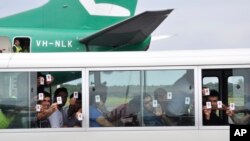Australian Prime Minister Malcolm Turnbull said Wednesday the United States is committed to honoring a deal to resettle a group of asylum seekers from Pacific island camps, even after President Donald Trump signed an order temporarily suspending U.S. refugee admissions.
The agreement was reached during the administration of former U.S. President Barack Obama. It involves about 1,200 migrants who were intercepted trying to reach Australia and taken to the camps in Papua New Guinea and Nauru.
White House spokesman Sean Spicer told reporters Tuesday that "extreme vetting" will be applied to all of the refugees.
Trump began using that term during his campaign for president to describe increased scrutiny of who is allowed into the United States. He first said he wanted to ban all Muslims from entry, but later shifted his policy to one advocating extreme vetting.
The bulk of the refugees involved in the agreement with Australia are from Afghanistan, Iraq and Iran.
In addition to suspending refugee admissions for 120 days, and indefinitely for Syrian refugees, Trump's order also bans entry for 90 days to anyone from Iran, Iraq, Syria, Yemen, Libya, Somalia and Sudan.
Homeland Security Secretary John Kelly said Tuesday the listed countries lack the kind of law enforcement and record keeping necessary to convincingly describe the backgrounds of their citizens, and that the U.S. will be working with them and other nations to "tighten up on their procedures."
"I would be less than honest if I told you that some of those countries that are currently on the list may not be taken off the list anytime soon. They're countries that are in various states of collapse, as an example, but, ultimately we'd like to see all those countries taken off the list."
In addition to the refugees being considered under the Australia agreement, the U.S. is also preparing to process a group of 872 refugees who are due to arrive this week.
"The Executive Order calls for refugees that were ready to travel, where it would cause undue hardship, that they should be considered for waivers. We have done that in concert with our Department of State colleagues," said Kevin McAleenan, the acting commissioner of the U.S. Customs and Border Protection agency.
Kelly also reiterated the Trump administration's defense that the immigration order, which includes seven Muslim-majority nations, is "not a ban on Muslims." He said religious liberty is one of the nation's most fundamental values.
U.S. Representative André Carson, a Democrat from the midwestern state of Indiana, told VOA's Deewa service the order plays into the recruitment narratives used by militant groups such as Islamic State and al-Qaida, and also sends the message to the seven countries that the U.S. does not trust them.
"I think it inflames Islamophobia, xenophobia, anti-immigrant sentiment. I think it stokes fears in those who see Muslims as being other, and I think it's un-American and un-patriotic," Carson said.
On Wednesday, Iranian President Hassan Rouhani said the entry ban went against "all international principles and commitments," and also contradicted what he said were longstanding claims that the U.S. government opposed the Iranian government, but not its people.
"The basis of this wrong action is illegitimate discrimination. They would always say 'we observe human rights.' This is a violation of human rights," Rouhani said.
Benjamin Johnson, executive director of the American Immigration Lawyers Association, told VOA's Persian service the order is likely to cause more problems than it seeks to solve.
"I have nothing against trying to ensure that our immigration system is secure by doing a review of our systems to ensure that they are adequately screening people and are sufficiently connected to the databases and the intelligence gathering that we need to make smart decisions," Johnson said. "But the notion that we would pass sweeping bans that look and feel a lot like they are focused more on religion and country of origin than they are on people's threat to the U.S. seems to me to be a terrible waste of resources and a completely wrong way to go."
Border security was a major part of Trump's campaign message. In addition to signing the entry ban order, he has also ordered the extension of a wall along the U.S.-Mexico border.
He frequently touted to his supporters his endorsement by the National Border Patrol Council, the union that represents the nation's border patrol agents.
McAleenan announced in a memo Tuesday the appointment of career border patrol official Ronald Vitiello as the new chief of U.S. Border Patrol. Vitiello had the support of the agents' union.







